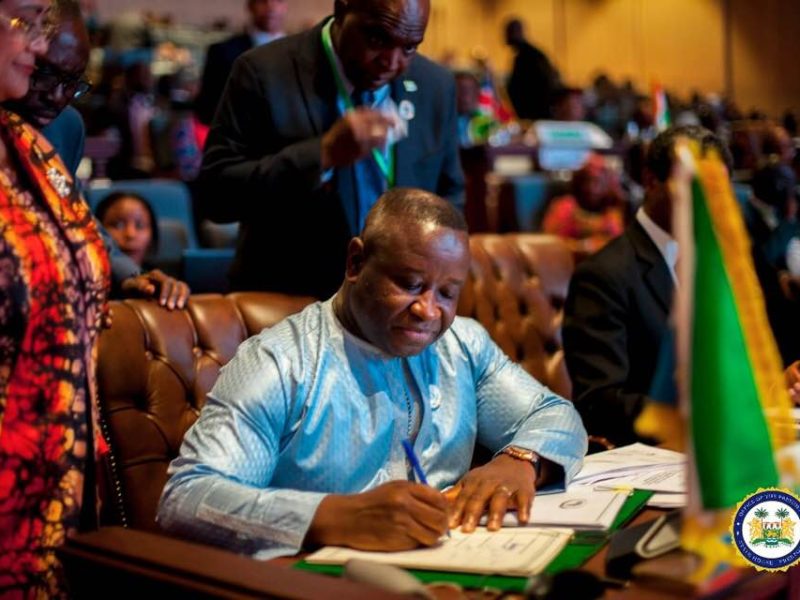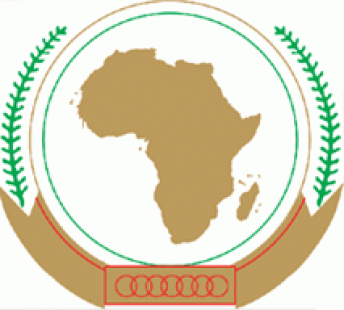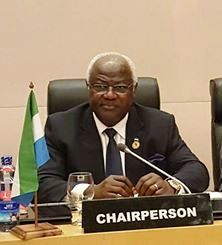France agrees to train 12,000 African Peacekeeping troops
The French government has agreed to train 12,000 African troops for the peacekeeping forces of the African Union and the United Nations over the 2010-2012 period. (Photo: L-R: Paul Biya (Cameroon), Bingu wa Mutharika (Malawi), Nicolas Sarkozy (France), Jacob Zuma (South Africa) and Prime Minister Meles Zenawi of Ethiopia)
This was disclosed by President Bingu wa Mutharika of Malawi who is also the Chairman of the African Union during a joint press conference in the city of Nice, France last Tuesday to mark the end of this year’s Franco-Africa summit. Together with him at the press conference were the host President Nicolas Sarkozy, Paul Biya of Cameroon, Jacob Zuma of South Africa and the Prime Minister of Ethiopia, Meles Zenawi.
The Final Declaration reads:
- The 25th Africa-France Summit was held in Nice on 31 May and 1 June 2010, a year of peace and security for Africa. Fifty-one delegations from African states took part in the summit with France, along with representatives of the African Union, the European Union, the United Nations, the International Organisation of the Francophonie and the Food and Agriculture Organisation of the United Nations.
- The summit was an opportunity to highlight the need to strengthen relations between France and Africa by creating a partnership based on shared interests and mutual trust. The Heads of State and governments reaffirmed the basic principles of equality, mutual respect of independence, sovereignty and integrity of States on which the partnership between France and Africa is based, as well as their commitment to enhancing the integration process, collective action and cooperation for the common good of their States and their peoples.
- The Heads of State and governments agreed on the importance of a multilateral system that is effective and representative of today’s world, based on a strong and reformed United Nations. In particular, they called for an urgent reform of the United Nations Security Council.
- They also called for a reform of global governance for the African continent to be better represented in the international forums. They fely a fair, broader, consistent and balanced representation of Africa at every level was needed in the G20. France announced its intention, on the occasion of its forthcoming G20 presidency, to ensure greater representation of African States. France, in preparation for its coming presidency of the G8, also announced its resolve to prepare far upstream the work for the Africa outreach exercise. The Heads of State and Government called for African States, including the Small Island Developing States, to be fully integrated into the global economy. The Heads of States and Government welcomed the progress of Africa’s representation at the World Bank, especially with the upcoming creation of an additional seat for Africa on its Executive Board, and ask the World Bank to continue improving Africa’s representation under the reform of its governance. They expressed the wish that Africa’s role also be reinforced within the IMF.
- The Heads of State and Government also called for the universalization of the European “Everything But Arms†initiative and the facilitation and acceleration of membership procedures for African States at the World Trade Organisation (WTO).
- France agreed to support the action of the African Union and its sub-regional organisations in bolstering their collective security system, in particular the African Standby Force, and in crisis management on the continent, in compliance with the Charter of the United Nations and the principles of international legality. To this end, France has pledged 300 million euros over the 2010-2012 period to support the efforts of African States and African sub-regional organisations. France also undertook to train 12,000 African troops for the peacekeeping forces of the African Union and the United Nations over the 2010-2012 period.
- Â The Heads of State and Governments reaffirmed their determination to tackle together transnational threats, such as terrorism, acts of piracy and armed robbery at sea, and the activities of transnational organised crime networks, in particular human trafficking and migrant-smuggling networks, and drug and arms trafficking, illegal exploitation of natural resources and hostage taking. They emphasised that these threats should be a priority, and committed to stepping up their cooperation, including at regional and sub-regional levels and through solidarity and an inclusive approach, to combat these threats in their entirety.
- They affirmed their will to seek appropriate solutions to the root causes behind movements of refugees and displaced persons and provide a sustainable response to their situation. To this end, they stressed the need to support post-conflict countries in their efforts to further stability and reconstruction, particularly in areas affected by war, and to encourage their initiatives to stimulate development and poverty eradication.
- They stressed with concern Africa’s growing needs, especially regarding development financing to achieve the MDGs by 2015 and beyond. To this end, they provided their support for the idea of holding an African conference on innovative financing and for the adoption of an African declaration on transparency of financial governance and fighting illegal capital flows. They agreed that these two initiatives could generate significant added value ahead of the 4th United Nations Conference on the Least Developed Countries scheduled for the second half of 2011 in Turkey and could help mobilise additional, stable and predictable resources to supplement official development assistance and development financing efforts.
-  They affirmed their will to prevent institutional crisis on the continent and ensure compliance with constitutional standards, in accordance with the principles of democracy and the rule of law, including those of the African Union Charter on Democracy, Elections and Governance. The Heads of State and Government of Africa and France reiterated their support for Africa’s position to refuse government anti-constitutional changes. To this end, they decided to work, particularly with the African Union, African sub-regional organisations, the United Nations and the International Organisation of the Francophonie, to strengthen the technical and financial assistance mechanisms for electoral processes. They also urged economic and financial partners to provide increased and diversified support for democratically-elected governments to address the multiple challenges facing their countries.
- Â They underscored that the Copenhagen Accord on climate change marked a first step towards the conclusion of a comprehensive agreement in Cancun at the end of 2010. They asked that all the United Nations Member States commit to this Accord and that all its provisions be implemented as of this year. They called for the inclusion of the Copenhagen Accord political principles in the texts under discussion in UN bodies. In particular, they stressed the vital importance of giving concrete expression to the approved objective of limiting global warming to 2~C above pre-industrial levels. They recognised that this objective meant reducing global CO2 emissions by 50% versus their 1990 levels, while respecting the principle of common but differentiated responsibilities. They stressed the close connection between climate and development and reiterated the importance of the forests in mitigating greenhouse gas emissions. In this regard, they called for work in the REDD+ partnership launched in Paris in March 2010 and commended the advances made at the Oslo meeting on 27th May 2010. They highlighted the importance of fighting desertification. They called for developed countries to deliver on their Copenhagen pledges to provide 30 billion dollars to finance early action over the 2010-2012 period.
-  They recognised the importance of financial resources to effectively combat climate change and to support the African countries’ efforts to adapt to these changes. Acknowledging France’s substantial fast-start funding effort (420 million euros per year over three years) alongside the European Union, they called for the rapid and transparent implementation of this financing. They agreed on the need to create a long-term financing system to increase funding to 100 billion dollars per year as of 2020. They stressed the importance of the work of the UN High-Level Group on financing and called on it to produce concrete recommendations by the autumn to inform discussions before the Cancun Conference. They supported the principle of a tax on certain international financial transactions, with the exception of social transfers, to be used for development and combating climate change, and which takes into account the different situations of developed and developing countries. The base and arrangements for levying the tax are to be determined.
-  The Heads of State and Government will support the development of a “renewable energy’’ plan to provide Africa with a sustainable electricity system based on concrete projects and innovative financing. Given the African continent’s huge potential in the area of new and renewable energies, particularly solar power using concentrated thermodynamic technology. Lastly, given the strong rise in energy needs, they stressed how important it was to mobilise more investments and and to implement new public policies to diversify energy production, improve access to energy, promote energy efficiency and develop renewable energies. To address the world energy crisis that has harmful effects on Africa and is slowing its development. France will support sub-regional, trans-regional and trans-continental energy integration initiatives.
- Â They agreed on the need to increase the resources allocated to the United Nations Environment Programme (UNEP), whose presence in Nairobi will be reinforced to make it a truly global environmental organisation.
- Â They used the International Year of Biodiversity to reaffirm the importance of adopting ambitious and concrete targets to curb the erosion of biodiversity at the Conference of the Parties to the Convention on Biological Diversity in Nagoya in October 2010. The conservation of biodiversity and ecosystem services is vital to areas as varies as agriculture, food, fisheries, medicine and energy.
-  They committed to strengthening the synergies between migration and development strategies, in keeping with strategies and action plans drawn up in Rabat, Tripoli and Lisbon. They decided to place the African diasporas living in France at the centre of these efforts, promoting their involvement in the economic and social development of their countries of origin by means of co-development programmes, encouraging migrant business projects and mobilising their savings for social and productive investment. They welcomed the decision by financial operators and insurance firms to reduce the costs of remittances and offer new services suited to migrants’ needs and the needs of their countries of origin. They commended the arrangements that France has made with financial operators to improve the co-development savings mechanism to make it more attractive and more suited to investment projects in the countries of origin. They recognised the need to support the development efforts of African States in order to prevent illegal migration flows. They stressed the need to regulate the activity of intermediaries of migrants’ remittances.
- Â They recognised the importance of the role and joint efforts of States, businesses and professional organisations to mobilise financing, modernise the training systems and develop occupational courses for better quality training. They stressed the need to improve the business law environment, in particular by making it clearer and more predictable so as to encourage economic activity and investment. They also agreed on the importance of establishing a framework for dialogue between governments and the private sector to help implement reforms. They underscored the need to keep mobilising business aid resources.
- Â They also recognised the importance of providing businesses, especially SMEs, with effective financing instruments vital to their growth. France has committed to significantly enhancing the European partnership initiative which aims to co-finance investments in businesses in Africa, which is being implemented by all the European development institutions. An additional tranche of this programme could raise 250 million euros by 2010.
- Â The Heads of State and Government also welcomed increases in capital of multilateral development banks, the first being the three-fold increase in capital of the African Development Bank, which was decided in Abidjan on 28 May 2010. This should very significantly increase private sector financing in Africa.
-  The Heads of State and Government stressed the vital importance of food security on the African continent. They called for the sustainable management of African fish, subsistence and agricultural resources. They agreed to work together on a mechanism, under the French presidency of the G8/G20 and beyond, to combat volatile agricultural commodity prices and strengthen food security. France also announced the creation of an investors’ fund, the African Agricultural Fund, to support the development of agricultural projects in Africa and food distribution projects. This fund will initially raise 120 million dollars, which could eventually reach 300 million dollars.
- The Heads of State and Government affirmed the need to contain the effects on natural disasters in Africa.
- They reiterated the importance of the framework provided by the Africa-European Union Strategic Partnership established in Lisbon. They committed to working with a view to the November 2010 Africa-European Union Summit on concrete priority projects of common interest.
- They noted and welcomed the adoption of the Charter for French Companies in Africa presented at the Summit. They acknowledged that it is one of the examples of best practices for corporate governance.
- The Heads of State and Government of Africa and France agreed to meet every three years, alternately in Africa and in France, and to agree on the main items on the next Summit a year in advance. The next Summit will take place in Egypt. A meeting of Foreign Ministers will be held between the two Summits in order to ensure follow-up of decisions and commitments made during the Africa-France Summits. Furthermore, a regular follow-up mechanism will be set up.
Chernor Ojuku Sesay, Information Attaché, Sierra Leone Embassy, Brussels/EU
Stay with Sierra Express Media, for your trusted place in news!
© 2010, https:. All rights reserved.






